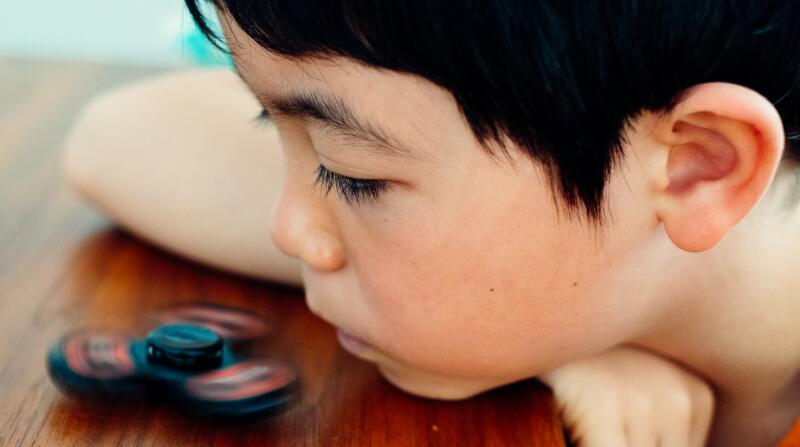Common Signs of ADHD in Children

Medically Reviewed By William C. Lloyd III, MD, FACS
-
 When Is It ADHD?If you have kids, you know they can have trouble sitting still, resisting the urge to break the rules, or finishing a chore like making the bed. But does this mean they have attention deficit/hyperactivity disorder (ADHD)?
When Is It ADHD?If you have kids, you know they can have trouble sitting still, resisting the urge to break the rules, or finishing a chore like making the bed. But does this mean they have attention deficit/hyperactivity disorder (ADHD)? -
 Disrupting Daily LifeNot paying attention, running around when asked to stay put, even meltdowns at the grocery store--all kids misbehave from time to time. But ADHD in children is more than just misbehavior. When these behaviors carry on for months, are unusually intense for the child's age, and hamper his or her ability to get along at school or home, there may be a problem.
Disrupting Daily LifeNot paying attention, running around when asked to stay put, even meltdowns at the grocery store--all kids misbehave from time to time. But ADHD in children is more than just misbehavior. When these behaviors carry on for months, are unusually intense for the child's age, and hamper his or her ability to get along at school or home, there may be a problem. -
-
 Troubling Behavior PatternsADHD is one of the most common childhood disorders, affecting 3 to 5 percent of U.S. kids--more often boys than girls. It's a pattern of three key behaviors: inattention, hyperactivity, and impulsivity.
Troubling Behavior PatternsADHD is one of the most common childhood disorders, affecting 3 to 5 percent of U.S. kids--more often boys than girls. It's a pattern of three key behaviors: inattention, hyperactivity, and impulsivity. -
 Loss of FocusDoes your child forget or lose things like homework or toys? Does he or she get bored with something, even after only a few minutes? These are signs of inattention. Symptoms of inattention may also include:
Loss of FocusDoes your child forget or lose things like homework or toys? Does he or she get bored with something, even after only a few minutes? These are signs of inattention. Symptoms of inattention may also include:
- Trouble following instructions
- Being easily distracted
- Struggling to focus on one thing and often jumping from one activity to another
- Daydreaming or seemingly not listening when spoken to
- Trouble following instructions
-
 Excess EnergyFidgety hands and feet, squirming bodies, and motor mouths--all are noticeable signs of hyperactivity, another key symptom of ADHD. You may also notice:
Excess EnergyFidgety hands and feet, squirming bodies, and motor mouths--all are noticeable signs of hyperactivity, another key symptom of ADHD. You may also notice:
- Constant motion, including running and climbing in the wrong place and at the wrong time
- Problems playing quietly
- Trouble sitting still and staying seated
- Constant motion, including running and climbing in the wrong place and at the wrong time
-
 Patience ProblemsIf you've gotten reports back from teachers that your child has trouble being patient or waiting turns, this could signal impulsivity, a third symptom of ADHD. Blurting out answers and comments and often interrupting others are also signs. Acting without thinking about consequences and not being able to keep emotions in check could be additional cues that your child is struggling with ADHD.
Patience ProblemsIf you've gotten reports back from teachers that your child has trouble being patient or waiting turns, this could signal impulsivity, a third symptom of ADHD. Blurting out answers and comments and often interrupting others are also signs. Acting without thinking about consequences and not being able to keep emotions in check could be additional cues that your child is struggling with ADHD. -
-
 Faces of ADHDThere are three forms of ADHD, each determined by which symptoms most affect the individual. The three types:
Faces of ADHDThere are three forms of ADHD, each determined by which symptoms most affect the individual. The three types:
- Predominantly inattentive
- Predominantly hyperactive-impulsive
- Combined
- Predominantly inattentive
-
 Missing the MarkThe predominantly inattentive type may be easy to overlook. Children with this type of ADHD mostly have symptoms from the inattentive category, meaning they may sit quietly, unnoticed, but are not listening to details, following instructions, or finishing tasks. Because children with this type are less likely to have trouble interacting with others and acting out is less common, parents or teachers may not recognize this type of ADHD.
Missing the MarkThe predominantly inattentive type may be easy to overlook. Children with this type of ADHD mostly have symptoms from the inattentive category, meaning they may sit quietly, unnoticed, but are not listening to details, following instructions, or finishing tasks. Because children with this type are less likely to have trouble interacting with others and acting out is less common, parents or teachers may not recognize this type of ADHD. -
 The Squeaky WheelFidgety and restless, impulsive and constantly on-the-go--the hyperactive-impulsive type is more easily recognized. The majority of symptoms for this type come from the hyperactivity and impulsivity categories. Take note of excessive talking, interrupting, snatching things away, and talking out of turn. This type may also be more prone to accidents and injuries.
The Squeaky WheelFidgety and restless, impulsive and constantly on-the-go--the hyperactive-impulsive type is more easily recognized. The majority of symptoms for this type come from the hyperactivity and impulsivity categories. Take note of excessive talking, interrupting, snatching things away, and talking out of turn. This type may also be more prone to accidents and injuries. -
 Combined SymptomsThe combined hyperactive-impulsive and inattentive type is--you guessed it--a combination of the other two categories. Symptoms of the two categories are equally present in this type, which accounts for most cases of ADHD in children.
Combined SymptomsThe combined hyperactive-impulsive and inattentive type is--you guessed it--a combination of the other two categories. Symptoms of the two categories are equally present in this type, which accounts for most cases of ADHD in children. -
 How You Can HelpTalk with your child's doctor if you suspect he or she is struggling with this common disorder. No single test can pinpoint ADHD, just as no single behavior is indicative of the disorder. A health professional will need to analyze your child's behavior, environment, and other factors to rule out other possible causes.
How You Can HelpTalk with your child's doctor if you suspect he or she is struggling with this common disorder. No single test can pinpoint ADHD, just as no single behavior is indicative of the disorder. A health professional will need to analyze your child's behavior, environment, and other factors to rule out other possible causes.
Common Signs of ADHD in Children




















